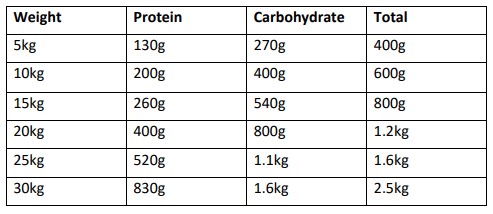Dogs and cats can develop intolerances or allergies to a variety of ingredients in their diets. Most commonly in dogs these are: beef, chicken, lamb, wheat, corn, soy, dairy and eggs. Rarely do dogs react to additives, dyes or preservatives. Cats most commonly react to fish, beef and dairy products.
Signs of food allergies or intolerances can vary but generally are associated with itching and/or ear infections. Sometimes there is also gastrointestinal upsets including diarrhoea.
Diagnosis of food allergies/intolerances in animals can only be achieved through an elimination diet where the ingredients of the previous diet are completely excluded for a period of 6-8 weeks. If there is an uncomplicated food allergy then the symptoms should significantly improve in time. It takes 2 weeks for the antigen to be eliminated. Then the subsequent 4-6 weeks for reduction in inflammation.
At the end of the 6-8 weeks we will recommend returning to all of the original diet and this is known as “the rechallenge”. Most dogs with food allergies will show a return of the symptoms within 1-3 days of eating the original diet but some may take up to 7 days. If there is a reaction to the original diet, return immediately to the elimination diet and then contact us.
If your pet has a positive reaction to the rechallenge, it is consistent with a diagnosis of food allergy and we will proceed with a sequential ingredient challenge to identify which ingredient/s your pet reacts against and which they can tolerate.
Some dogs have a combination of food and environmental allergies and in these cases, we often see a partial improvement while eating the elimination diet and a partial relapse of signs when challenged. Keeping notes or a diary can assist with these cases.
What to feed?
There is no such thing as a “good food” or “bad food” (except chocolate and onions). We can choose home-prepared diets which are theoretically more ideal but are more time consuming to prepare and not nutritionally balanced (unless we add supplements).
Alternatively, we can choose Prime 100 Single Protein Diet. The hypoallergenic formula includes kangaroo and pumpkin or crocodile and tapioca (go to www.prime100.com.au for your nearest supplier).
A third option is the prescription hydrolysate diet which is a commercial diet specifically formulated for investigating and managing food allergies and are only available from vets. They are Royal Canin Hypoallergenic or Hills Z/D Ultra. These diets are more convenient and nutritionally balanced but often not as cost effective.
The principle with home prepared elimination diets is that we choose a novel protein and carbohydrate. This is something your pet has not been exposed to previously and therefore cannot be allergic to. Some examples of these are below:
- Proteins / Meats: Crocodile, kangaroo, buffalo, donkey, horse, goat, rabbit (meat availability varies)
- Carbohydrates: Pumpkin, sweet potato
- Other vegetables: Can be fed: Peas, carrots, celery, cabbage, chick peas, barley, tapioca and lentils. Do not feed corn, rice, pasta or white potato.
Treats are important but we need to remember that they contain some of the possible ingredients your pet is allergic to so it is important NOT to feed your pet’s usual treats during the elimination diet. We advise substituting with fresh bones (the same as the NEW meat source) or some fruit such as apple, pear or melon. Specific treats may also be available such as “sweet potato” chews. But we advise not to feed any “smoked” treats.\
Please also be aware that some medications are flavoured (such as antibiotics, arthritis tablets, heartworm and flea control) and these should be discussed with the Veterinarian as to whether a substitute can be used for the duration of the trial.
Approximate volume of food – total daily amount may be divided.
This varies with each individual dog and should be used as a guide only:

